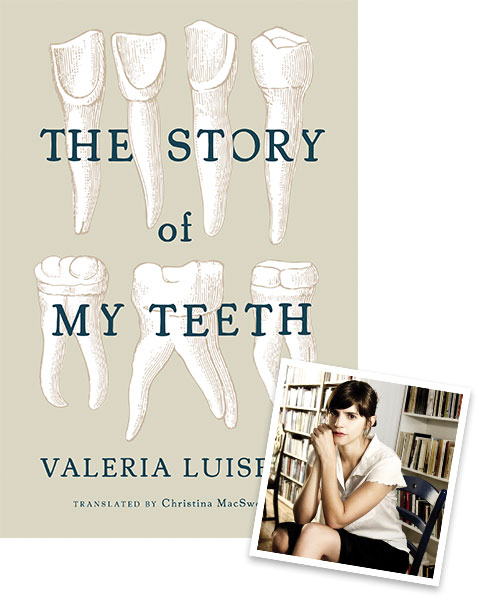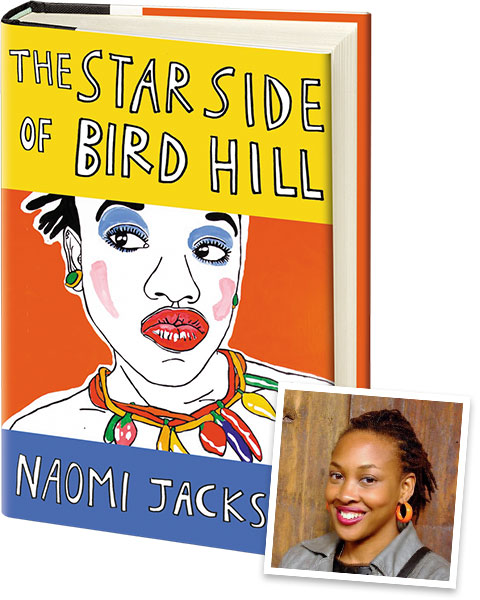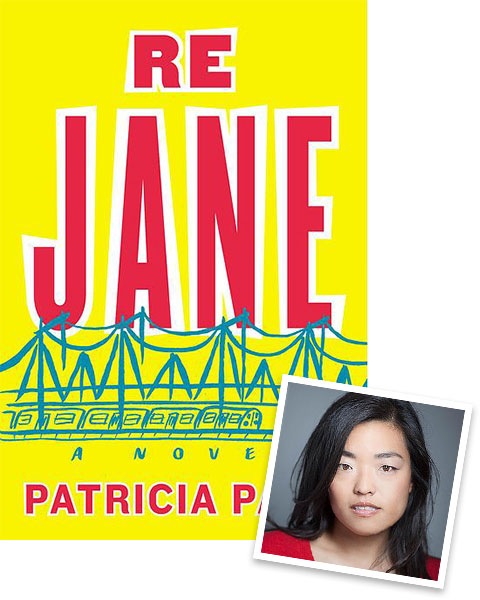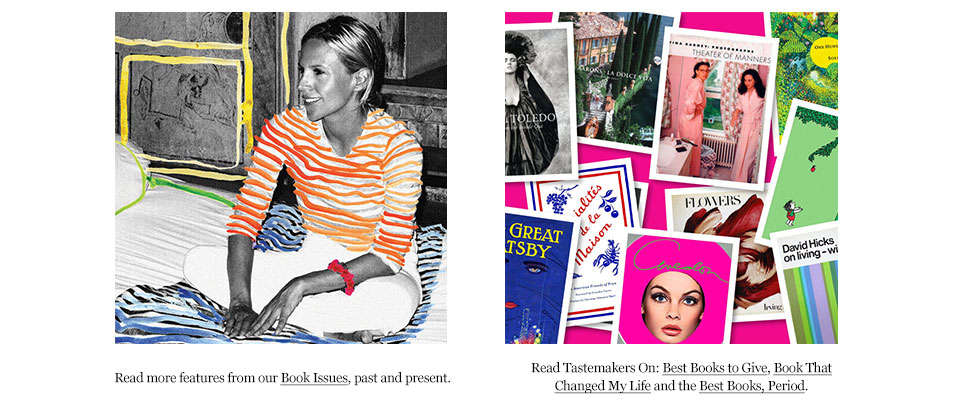The three writers featured here have roots from all over the world. They tackle different subject matters — from family and a pull towards independence to art world musings — and are drawn to different writing styles and literary references. But there’s one thing they all have in common: They’re talented, and you should add them to your must-read, must-know list stat.
Valeria Luiselli
From a winner of the National Book Foundation’s “5 under 35” award in 2014, Luiselli’s magical book The Story of My Teeth (Granta) — the English translation of which comes out this fall — tells the story of auctioneer Gustavo “Highway” Sánchez, who sets off to replace his less-than-desirable teeth with the perfect pearly whites…
The backstory of The Story of My Teeth…
I received a commission from Mexico City’s Jumex Foundation, a very big contemporary art collection that was having an exhibition. The gallery is physically next to the Jumex juice factory and is funded by revenue from the juice production. They wanted me to write a fictional piece — blog entries — for the catalogue, but I suggested writing a novel in installments for the workers in the factory whose work ultimately funds the art. A reading group of about 12 workers got together once a week to read my installments out loud; they discussed them, criticized them, told their own stories… The sessions were recorded and the audio files sent back to me in New York. I would listen to the session and, with that material, write the next installment. This went on for a couple of months.
And that process was…
Completely different than what I am accustomed to. I usually take a long time to write — I write in small fragments and then I work and rework until I feel I have a solid little piece. In this case, I was writing for a group of people who needed to receive an entire installment, from beginning to end, each week. So I had to change my preoccupation with style, my message, my own manias… The discussions held during their sessions really became the novel. One of the central things they discussed was the actual value of the pieces in the exhibit — I mean, there’s a huge divide; years and years of their work may fund one single art piece — so it occurred to me to write something that questioned value in art but in a way that was entertaining for these workers.
Favorite line in the book…
I’m not sure. I like the characters very much — as soon as I found the thread of the voice for [the main character] Highway, he became very endearing to me.
And the inspiration behind that character, Gustavo Sánchez (A.K.A. Highway), who’s an auctioneer…
I have an uncle who’s a salesman in a big urban market in Mexico City, where you can buy everything from car parts to used books to fish. He has all sorts of fascinating stories about this sort of selling and trading. The initial voice came from him, but the development of the character came from listening to the workers and thinking about ways to narrativize their conversations. I particularly fell in love with one of the voices in the recordings and tried to emulate that to a degree.
Most challenging part about writing this book…
The post-production. I wrote and wrote and wrote in order to turn in the installments on time. But then I had to put them together in a book. The installments were very episodic by nature — they had a beginning and end to each of them because they had to work as independent pieces. That was a challenge itself, but then, of course, I had to put all those things together in a book that itself had a thread without losing the episodic nature of the installments. Striking that balance was difficult. The finished novel is not the installments put together, but a very reworked version of them.
The authors who influenced me the most…
There are influences that are long lasting and deep, but when I’m writing a book, I’m always looking for a constellation of writers with whom I want to have a dialogue. With this particular book, I was reading Daniil Kharms a lot. I was also reading Gaius Suetonius Tranquillus’ The Twelve Caesars.
And the reasons why…
Daniil Kharms — his sense of humor is always tragic. He has a way of portraying daily life which is always in the rank of the absurd. In the case of Tranquillus, The Twelve Caesars is an absolute masterpiece in style.
Best writing advice received…
It’s really important to not stop writing when you feel you’ve reached a dead end. On the contrary, precisely when you’ve reached a dead end, you should focus and really, really go on and not go to sleep until something happens.
How I combat writer’s block…
I don’t really have writer’s block. I know it takes time for books to happen. I recognize these periods and basically dedicate myself to reading and taking notes and then I sit down to write, which is something that’s been growing silently. I never sit in front of the computer and say, OK, now I have to come up with an idea and write something. I slowly cook something up, for years sometimes.
What I’m reading now…
I’m reading this Czech writer, Bohumil Hrabal. He has a wonderful little book called Dancing Lessons for the Advanced in Age.
What’s next…
After a year of reading and incubating and taking a lot of notes, I’m beginning a novel. I was in a residence in Berlin last month and was able to write the first 10 pages. I don’t want to say much more about that.
Naomi Jackson
The debut novel from Jackson, The Star Side of Bird Hill (Penguin Press), spotlights Brooklyn sisters Dionne and the younger Phaedra, who are sent to live with their grandmother in Barbados as their mother recovers from depression. Phaedra fits right in; Dionne rebels, longing to return to New York…
The backstory of The Star Side of Bird Hill…
I grew up in Brooklyn with Caribbean parents — my mother’s family is from Barbados and my father’s is from Antigua. I would go to both places during the summers. I always wanted to write about that kind of experience — of going to a place that feels like home but isn’t quite home.
Growing up, my career ambitions…
I used to threaten my family that I would write about them, but I don’t know that I felt writing was a viable profession. The jury is still out on that one.
The Star Side characters vs. me…
When you’re writing a debut novel, particularly a coming-of-age story, everyone thinks, “Oh, this is your story! And it’s all true!” But I think that takes away from the real mastery that it takes to write a fictional narrative. I certainly went home for the summers and I do have an older sister with whom I am very close. And I definitely see parts of me and my sister in the book, but I wouldn’t say that we are either one of those girls. I like to say that the most interesting things that happen in the book didn’t happen to me.
Favorite line in the book…
I love the opening. I was just talking to my agent this morning and we were saying how the first paragraph of the book has been the same for the last four years. The book has gone through maybe nine drafts, but the opening scene has basically stayed the same. I like the fact that it has a big scope — it’s looking at Bird Hill telescopically. It zooms out and then zooms in to look at these kids and what they’re doing. I think that speaks to the way I wanted to write the book; it’s as much about the characters — the girls, their grandmother, mom and dad — as it is about the place they’re living in.
Most challenging part about writing this book…
Getting through the middle, getting over the hump. I got to about 60 or 70 pages and felt really stuck; it was hard to move the book past that. And then I had an ending that wasn’t working at all and trying to figure out how to fix it was probably the second obstacle.
And I got over the above by…
I had a friend, who went to the Iowa Writers’ Workshop with me, who saved me at eleventh hour by reading [what I wrote] and giving me some ideas. So, I called in one of my life lines to help me in that case. Everyone thinks that writing is a solitary act, but I don’t think that way. Not for me.
The authors who influenced me the most…
Edwidge Danticat, who is Haitian American and writes about Haiti and also Brooklyn. Junot Díaz’s Drown, which is set in the Dominican Republic and New York. Tiphanie Yanique, whom I’m actually going to be in conversation with at Greenlight Bookstore in Brooklyn on June 30th at 7:30 PM, is a guiding light for Caribbean writers. Chimamanda Adichie’s Purple Hibiscus, June Jordan’s Soldier, Shay Youngblood’s Soul Kiss and, of course, Jamaica Kincaid’s Annie John.
Book that changed my life…
Annie John. Before that, I hadn’t read a book about a Caribbean girl that really spoke to me. She was just so irreverent and the girls in that book just did what they wanted to do. There’s also a scene of these girls playing in the graveyard that certainly influenced my writing.
Best writing advice received…
I had a workshop back in 2003 with a poet named Quincy Troupe and he told us that a lot about being successful in writing is just being persistent and having the stamina to keep going.
How I combat writer’s block…
I don’t know. Keep writing? I find that when I’m stuck, reading something or going back to a piece I’ve written that I’ve loved usually helps me generate some new ideas.
What I’m reading now…
I just came back from The Bocas Literary Festival in Trinidad, so I have a bunch of really amazing books by new authors who are based in the Caribbean. I’m reading some of those books. And I actually just started re-reading Rita Mae Brown’s Rubyfruit.
What’s next…
I’m two-thirds of the way into a draft of a novel. It’s called Behind God’s Back and is a multigenerational historical saga set in Brooklyn. It’s bigger in scope than Star Side and told in three different perspectives by three different characters — a grandmother, a mother and a daughter. People say that the best cure for drowning out the noise of a first book publication is to keep working on something new.
And this theme of family resonates with me because…
For better or worse, it’s one of my obsessions! I’m just so interested in the way people are shaped by family, the ways that people decide to move on from family, how family trauma and support shapes us as human beings….
Patricia Park
Jane Eyre retold through Korean-American eyes — that’s the premise of Patricia Park’s recent debut novel, Re Jane (Pamela Dorman Books). The heroine here is Jane Re, a half-Korean orphan raised in Queens who becomes an au pair in a Brooklyn household headed by a brooding English professor of a father…
The backstory of Re Jane…
When I was little and misbehaved, my mom would say to me in her broken English, “You act like orphan.” That always struck me as very strange because you’re either an orphan or not, and how do you act like one? I realized that, for her and her generation of war-time Koreans, to act like an orphan meant you behaved in a very disgraceful way that brought shame to your family. When I read Jane Eyre, I noticed that Jane was also thrown similar epithets. I saw the parallels between the Victorian understanding of the orphan and the Korean Post-War one. That was the official genesis of Re Jane.
Jane vs. me…
On a surface level, I was born in Queens whereas Jane was born in Korea. Jane is mixed-race Korean; I am not, and I was not adopted. Jane represents a very marginalized figure within Korean society. Up until recently, Korean society was one that really valued homogeneity and ethnic purity and Jane’s mother, as the story goes, had relations with an American; in many ways, she’s wearing her mother’s shame. She’s an other among the others, a minority within a minority. I found that a really fascinating starting point. I wanted to explore a character who mainstream America automatically lumps into her minority community, but who doesn’t even have acceptance within her community.
Favorite line in the book…
“This was my America — all Korean, all the time.” It speaks to my own experience growing up in Queens, too, and the experience of other hyphenated Americans. You grow up on American soil and yet your version of America is very different from, you know, what we think of as the Heartland.
Most challenging part about writing this book…
Fighting off the urge to just throw it away. Because it seemed like there was never a finishing line in sight. Also, the conventions of a 19th-Century novel are very different from a modern-day one. It’s not very acceptable to have marriage proposals from your cousin, you know. And 19th-Century heroines are a lot more passive than their modern-day counterparts. As forward-thinking as Jane Eyre was, she was still a product of her times. In my early drafts, I was staying more closely to the original text and it made for a rather passive protagonist. I had to cut ties after a certain point.
Aside from Charlotte Brontë, the authors who influenced me the most…
I really love Jane Austen — I love her social commentary, her blatant use of language. I like Laurie Moore a lot — she takes weighty issues and cuts them with humor. The books that influenced me while I was writing Re Jane, that I went to over and over again, was not just Jane Eyre but The Great Gatsby — which tackles these scenes of being a New Yorker and the different class issues within New York — and Graham Greene’s The Quiet American.
Best writing advice received…
I studied with Ha Jin in grad school and he used to say, “Put everything, everything in the novel.” Because I was trying to think of different ideas for future novels — the grocery store and Queens angles in Re Jane could be different novels — and he said to put it all in one novel. That, and then he would say, “It’s all about the small moments.” So much of life can be distilled in these small moments, these small gestures.
How I combat writer’s block…
Athletic activity. Sometimes when I would get stuck, I would get up and go for a run. And it’s not even so much that I work out problems in my head but that I shake off a lot of anxious energy, that kind of anxious energy that was keeping me from myself, or writing for myself.
What I’m reading now…
The Dirty Life, “a memoir of farming, food and love” by Kristin Kimball. She’s a thirty-something New York-based writer who goes on assignment to interview a young farmer in Pennsylvania, falls in love and decides to change her life, uproot and become a farmer. She and her husband run a place called Essex Farm upstate, and only eat what they produce. It goes counter to everything you think New York writers are about — New York is urban, you have your black uniform, your heels…
What’s next…
My second book is about the Korean community in Buenos Aires. It’s about a minor character in Re Jane who gets his own novel. Even though he’s born-and-bred Argentine, he’s always considered the other. He and his family emigrate to New York with the financial crisis and is constantly facing these identity issues. I have a lot of family from Argentina and my mother was an Argentine citizen, so I’m drawing off that.
And this theme of identity resonates with me because…
Because I’m a “hyphenated” American, I don’t take identity for granted — I can’t. Because my whole life, even though legally I’m American, I was never treated as one or thought to think of myself that way. I’m fascinated by people who are outsiders among outsiders.




